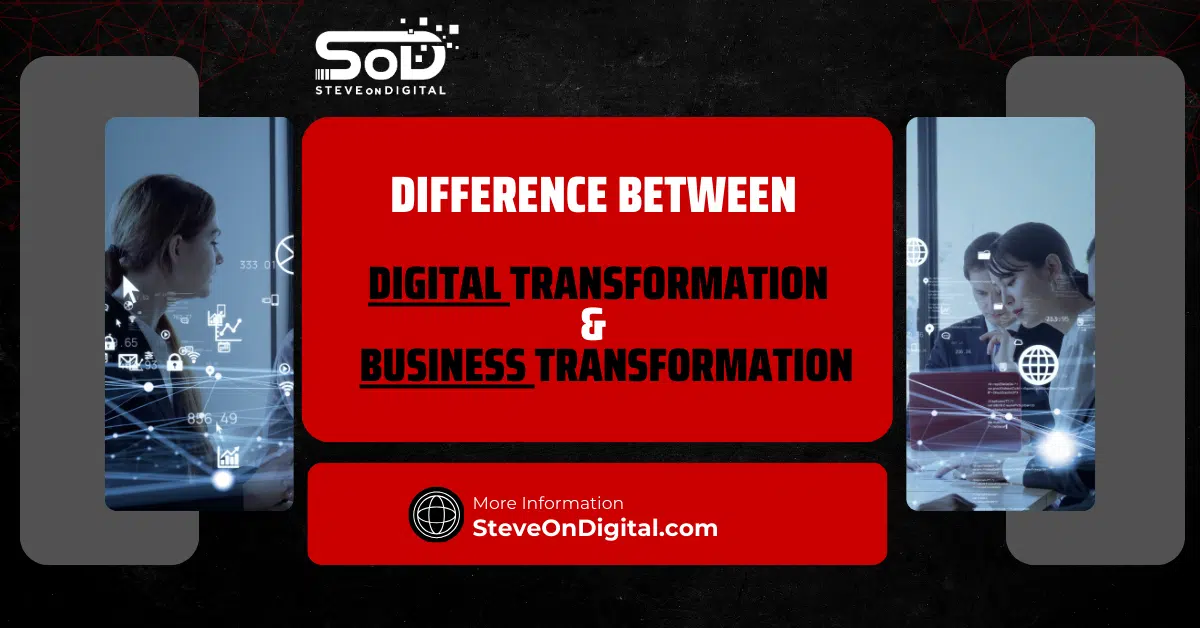As a Digital Transformation Specialist with a rich background in electrical engineering, an MBA, and a master’s in Project Management, I’ve dedicated my career to helping small and medium-sized enterprises (SMEs) harness the power of digital skills.
Through my YouTube channel and LinkedIn profile, I extend my reach to over a million business owners and IT directors, offering insights and practical advice to navigate the digital landscape effectively.
My goal is to ensure that SMEs not only understand the necessity of digital skills but fully integrate these tools to enhance their business operations and growth.
In this blog, I’ll discuss the critical role digital skills play in transforming SMEs, drawing from real-life scenarios to demonstrate how these skills can turn challenges into opportunities for your business.
Introduction To Digital Skills In SMEs
Digital skills are increasingly becoming the backbone of modern small and medium-sized enterprises (SMEs).
In today’s digital economy, the ability to navigate through digital tools and technologies isn’t just an advantage; it’s a necessity for survival and growth.
As someone deeply involved in the digital transformation of SMEs, I’ve witnessed firsthand how mastering these skills can dramatically alter a business’s trajectory.
The Digital Economy And SMEs
The digital economy is reshaping how businesses operate, providing unprecedented opportunities for growth and expansion.
For SMEs, adapting to this new landscape means more than just surviving; it involves thriving by leveraging digital skills to stay competitive.
Digital skills enable businesses to harness the power of digital tools to streamline operations, enhance customer engagement, and optimize their business processes.
The integration of digital skills into SME operations is crucial for tapping into new markets and adapting to the fast-paced changes brought about by the digital revolution.
From cloud computing to big data analytics, these technologies are not just buzzwords but essential tools that drive business success.
The Importance Of Digital Skills For SMEs
Why are digital skills so vital for SMEs?
The answer lies in their ability to transform challenges into opportunities.
In my role as a Digital Transformation Specialist, I have guided many SME owners through the process of adopting and adapting to new digital technologies.
The journey is often challenging, but the rewards are undeniable.
Digital skills are not just about using technology; they are about changing the way we think about and do business.
Business Performance Enhancement
One of the most significant benefits of digital skills is the enhancement of business performance.
By adopting digital tools, SMEs can automate routine tasks, freeing up human resources to focus on more strategic activities.
This shift not only improves efficiency but also boosts productivity.
For example, by implementing customer relationship management (CRM) systems, businesses can better understand their customers’ needs and tailor their offerings accordingly, leading to improved customer satisfaction and loyalty.
Moreover, digital skills facilitate better decision-making.
With access to real-time data, SME managers can make informed decisions quickly, responding to market changes with agility.
This data-driven approach is a crucial skill in the digital age, as it empowers businesses to identify opportunities and mitigate risks effectively.
Expanding Market Reach
Digital skills also play a pivotal role in expanding a business’s market reach.
The internet has dissolved geographical barriers, allowing SMEs to access global markets with just a few clicks.
Through e-commerce platforms, social media marketing, and other digital channels, businesses can reach a wider audience than ever before.
Additionally, digital literacy helps SMEs to engage with different stakeholders from various parts of the world, enhancing their visibility and credibility on the global stage.
This expanded reach is not just about selling products or services; it’s about creating lasting relationships that foster growth and innovation.
Essential Digital Skills For SME Success
Understanding and integrating digital skills into the day-to-day operations of small and medium-sized enterprises (SMEs) is crucial for their success in today’s market.
I’ve seen from my experience, and through the data I’ve gathered, that SMEs that embrace digital transformation not only survive but thrive.
Foundational Skills In Digital Literacy
For any SME, the journey towards digital competence starts with foundational digital literacy.
This includes basic skills like understanding how to use digital tools that manage business processes, from digital accounting software to customer relationship management (CRM) systems.
These tools are not just facilitators; they’re necessities in our rapidly evolving digital economy.
Navigating through these technologies efficiently is something I emphasize in my workshops and seminars.
It’s about ensuring that every member of your team can utilize these digital resources to their full potential, which is essential for optimizing your operations and enhancing your business performance.
Advanced Digital Skills
As we dig deeper, the importance of advanced digital skills becomes evident.
These include data analytics, which allows SMEs to harness and interpret vast amounts of data for better decision-making.
Cybersecurity is another critical area, as protecting customer data and business information has become a paramount concern in the digital age.
In my experience, incorporating these skills has not only shielded businesses from potential digital threats but also positioned them as trustworthy partners in the eyes of their customers.
It’s about building a robust digital foundation that supports all aspects of your business, from protecting your data to making informed strategic decisions.
Developing Digital Skills Within SMEs
For SMEs to remain competitive, they must continuously develop their digital skills.
This development is an ongoing process, influenced by the rapid pace of digital innovation.
Training And Development Programs
Implementing effective training programs is a direct approach I recommend for fostering these skills.
Whether it’s through online courses, workshops, or hands-on training, the goal is to make these learning opportunities accessible and relevant.

For instance, my collaboration with local tech hubs has enabled tailored ICT training programs that meet the specific needs of SMEs, focusing on both enhancing current skills and introducing new ones.
These programs not only improve the workforce’s competencies but also raise awareness about the growing importance of digital literacy in the modern business landscape.
Building A Learning Culture
Creating a culture that values continuous learning and knowledge sharing is foundational to sustaining long-term digital growth.
In my role, I’ve encouraged SMEs to foster environments where employees feel motivated to develop new skills and share their insights with their peers.
This culture is not built overnight.
It requires commitment from all levels of the organization, especially from the top down.
As SME managers, fostering an environment where learning is integrated into daily activities can lead to significant improvements in business performance and innovation.
Overcoming Digital Skill Gaps In SMEs
In my years of experience helping small and medium-sized enterprises (SMEs) embrace digital transformation, one recurring challenge I’ve faced is the digital skills gap.
Understanding and addressing this gap is crucial for any SME looking to stay competitive in a rapidly evolving marketplace.
Financial And Resource Limitations
The most common hurdle I see SMEs face is the limitation of financial and human resources.
Many small business owners are concerned about the costs associated with upskilling their workforce and implementing new technologies.
However, what I’ve learned—and what I always share in my consultancy—is that the investment in digital skills development pays dividends.
To manage costs effectively, I recommend prioritizing essential digital skills that align with your business’s core needs and exploring financial support options available through various support initiatives and programs.
Many regions offer grants and subsidies to support digital adoption, which can lessen the financial burden on SMEs.
Technological Access And Digital Divide
Another significant challenge is the digital divide, especially pronounced in developing countries and less urban areas.
This divide can prevent SMEs from accessing the digital tools necessary for modern business.
My approach involves starting with the basics: ensuring stable internet access and providing basic ICT training.
From there, we can look at more advanced solutions like cloud-based services, which can be more economical and scale with the business.
Partnering with local governments and organizations can also provide the needed infrastructure or support to overcome these barriers.
Digital Transformation Through Skills Enhancement
Digital transformation is not just about technology; it’s about how these digital tools are integrated into your business through skilled use by your team.
Case Studies Of Successful Transformations
I’ve had the privilege of working with several SMEs that have transformed their operations through strategic digital skills enhancement.
For instance, a local retailer I worked with integrated e-commerce solutions that expanded their market reach significantly.
By training their staff on customer data analytics, they could personalize marketing strategies and enhance the customer experience, leading to a substantial increase in sales.
Another example is a manufacturing company that implemented advanced digital technologies to automate their production line.
This change required both technical training for their existing workforce and hiring new talent with the necessary digital skills.
The result was a remarkable improvement in production efficiency and a reduction in direct costs.
Impact On Customer Experience
Improving digital skills within an SME has a direct positive impact on customer experience.
With the right digital tools and skills, businesses can offer more personalized and efficient services.
For example, using CRM systems to manage customer interactions more effectively ensures that your business can respond more promptly and appropriately to customer needs, enhancing satisfaction and loyalty.
The Role Of Stakeholders In Digital Skills Development
In my years assisting SMEs to embrace digital transformation, I’ve observed that the development of digital skills doesn’t occur in isolation.
It’s a collaborative effort involving multiple stakeholders who each play a crucial role in shaping the digital landscape for SMEs.
Government And Policy Maker Engagement
Government initiatives and policies significantly influence digital skills enhancement.
For example, many governments provide financial support and incentives for SMEs to adopt digital technologies and for the training necessary to use them effectively.
Policies aimed at reducing the digital divide can also play a vital role in ensuring that all SMEs, regardless of location or size, have access to necessary digital resources.
In my experience, engaging with these initiatives can provide SMEs with not only the tools needed for digital transformation but also with a framework to guide their adoption.
This support is essential for small business owners who may feel overwhelmed by the pace of the digital revolution.
Collaboration With Educational Institutions
Partnering with educational institutions is another effective strategy for developing digital skills within SMEs.
These partnerships can provide tailored training programs that address specific skills gaps in the workforce.
I’ve facilitated several collaborations between SMEs and local universities, resulting in customized training sessions on emerging technologies and business processes that are directly applicable to the SMEs’ needs.
Such partnerships enhance the workforce’s skills and foster a culture of continuous learning and innovation.
The Global Context Of Digital Skills In SMEs
Digital skills development is a global phenomenon, with varying levels of integration and success across different countries.
Understanding these global dynamics can help SMEs position themselves more strategically in the international market.
Developed vs Developing Nations
The disparity in digital skills between developed and developing nations is often marked by the availability of advanced technologies and the capacity to adopt them.
Developed countries typically have higher technology adoption rates due to better infrastructure and more significant financial resources.
In contrast, SMEs in developing nations often struggle with more basic challenges, such as reliable internet access.
However, the rapid adoption of mobile technology in many developing countries is beginning to bridge this gap.
Mobile platforms offer a more accessible way for SMEs in these regions to access digital tools and develop crucial digital skills.
This shift is something I often highlight in my talks, illustrating the potential for rapid digital advancement when opportunities are seized.
Role Of International Alliances
International organizations play a pivotal role in leveling the playing field for SMEs across different economies.
The European Digital SME Alliance, for instance, is instrumental in promoting digital skills development among SMEs in Europe.
By advocating for supportive policies and fostering cross-border collaboration, such organizations help ensure that SMEs have the resources and knowledge necessary to compete in a global digital economy.
Preparing For Future Digital Challenges
As we move deeper into the digital era, it’s crucial for small and medium-sized enterprises (SMEs) like ours to anticipate and prepare for future technological shifts.
This isn’t just about keeping up; it’s about staying ahead and leveraging new technologies to enhance our competitive edge.
Adapting To Emerging Technologies
Looking ahead, technologies like artificial intelligence (AI), the Internet of Things (IoT), and blockchain are set to dominate the landscape.
These aren’t just buzzwords—they represent real opportunities for SMEs to streamline operations, improve customer interactions, and optimize our business processes.
For instance, AI can automate customer service, providing quicker responses and freeing up our team to focus on more complex tasks.
Preparing for these technologies means investing in digital skills development now.
I’ve personally led workshops on emerging technologies, helping business leaders understand how AI and IoT can be integrated into their current strategies.
This preparation ensures we are not just reacting to technological advancements but actively incorporating them into our growth plans.
| Technology | Description | Business Impact |
| Artificial Intelligence (AI) | Automates routine tasks, enhances decision-making. | Increases efficiency, improves customer service. |
| Internet of Things (IoT) | Connects devices for data collection and analysis. | Optimizes operations, reduces costs. |
| Blockchain | Provides secure, transparent transaction records. | Enhances security, builds trust in transactions. |
Fostering An Adaptive Workforce
A crucial part of preparing for future challenges involves cultivating an adaptive workforce.

This means training employees not just in the specific technologies we are using today but also in the skills of learning and adaptation itself.
Encouraging continuous professional development and fostering a culture of innovation are strategies I’ve seen deliver substantial benefits.
| Skill | Benefits | Example Implementations |
| Cross-functional training | Enhances team flexibility, reduces skill gaps. | Cross-training in customer service and sales. |
| Continuous learning | Keeps workforce up-to-date with latest trends. | Subscription to online courses, regular workshops. |
| Innovation encouragement | Fosters creative solutions, maintains competitive edge. | Hackathons, idea-sharing sessions. |
I always emphasize the importance of agility in digital adoption.
For example, by introducing cross-training sessions, employees can learn multiple aspects of the business, which enhances flexibility and reduces our vulnerability to sudden technological changes.
Final Thoughts
Reflecting on the importance of digital skills for SMEs, it’s clear that these competencies are not just beneficial but essential for our sustained growth and relevance in a fast-evolving business environment.
Key Takeaways For Business Leaders
For fellow SME leaders, my key advice is to view digital skills development not as a one-time investment but as an ongoing strategic initiative.
This includes understanding the digital landscape, recognizing the potential of new technologies, and committing to the continuous growth of our teams.
Digital skills empower our businesses to be more resilient, responsive, and ready for the future.
They enable us to optimize current operations and explore new opportunities for innovation and expansion.
Encouraging Proactive Skill Development
Finally, I urge all SMEs to proactively invest in developing digital skills across their organizations.
Whether it’s through partnerships with tech providers, engaging in new learning platforms, or setting up internal training sessions, the goal is clear—build a foundation that supports dynamic growth and innovation.
| Program Type | Target Skill | Description | Expected Outcome |
| Online Courses | AI, Cybersecurity | Courses from platforms like Coursera or Udemy. | Up-to-date knowledge in specific technologies. |
| In-house Training | CRM systems, IoT | Custom training sessions on new systems. | Better utilization of installed technologies. |
| External Workshops | Digital literacy | Workshops focusing on broad digital skills. | Improved general digital competence. |
As we continue to navigate the challenges and opportunities presented by the digital revolution, let’s commit to being learners as much as leaders, ensuring that our businesses not only survive the digital transformation but thrive within it.




